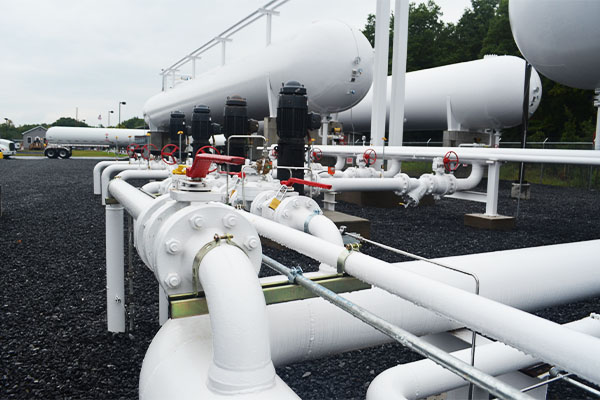‘Convergence of market factors’ in play for this winter
Propane prices are high, inventories are low, exports are strong, and the worry is increasing for some industry members as the winter heating season approaches.

Crestwood’s midstream propane terminal in Montgomery, New York. Photo courtesy of Superior Energy Systems
That was part of the sentiment shared during a National Propane Gas Association supply-focused webinar in August, as panelists urged propane marketer preparation ahead of winter.
At the time of the webinar, prices at Mont Belvieu were near 115 cents a gallon with a backwardated futures curve, and the U.S. had about 68 million barrels of propane in primary storage. Total inventory was more than 17 percent lower than the five-year average levels for the same time of year, according to the U.S. Energy Information Administration.
The issue is even more worrisome in the Midwest, where propane inventory in August was about 4 million barrels below the five-year minimum, noted Rusty Braziel of RBN Energy. Stocks were increasing but not as fast as usual. He questioned whether it would be enough to satisfy demand this winter.
“This is the propane business,” he said. “The answer to that question is it always depends on the weather. It also depends on propane production” and, in the case of the Midwest, how much production stays in PADD 2 versus getting shipped to the Gulf Coast for exports.
Exports, meanwhile, were running at about 1.3 million barrels per day – more than doubling over the past five years – as overseas markets, most notably in Asia, demand propane for dehydrogenation plants and steam crackers.
“I’ve never seen a convergence of market factors quite like we have coming at us this year,” said Braziel, who urged marketers to ramp up storage, firm up contracts, and build more flexibility and optionality into their supply chain.
“We may get through this winter with no problem,” he added. “My suggestion is: This is not the year to take chances with Mother Nature.”
The supply webinar also featured Tug Hanley of Enterprise Products Partners, Travis Ochs of ThompsonGas and John Powell of Crestwood. They urged marketers to form early preparation habits and stressed communication because the market doesn’t offer the same type of supply flexibility that it did five to 10 years ago.
Steve Kossuth of UGI Corp. moderated the panel discussion.
















